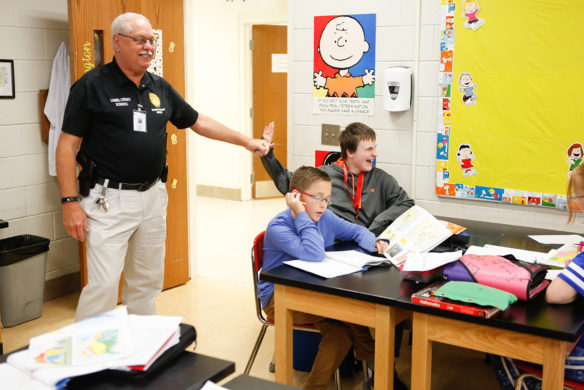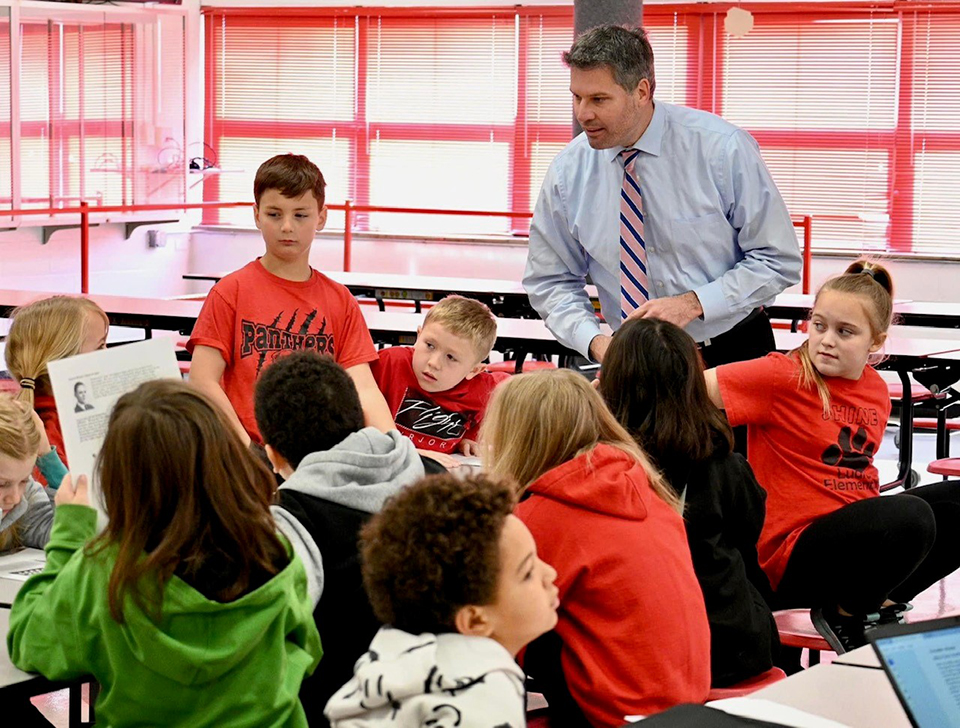
Charles Parker, a member of the Laurel County schools’ Security Response Team, high-fives a student as he drops into a class at South Laurel Middle School. In the future, there may be more school safety people with the passage of Senate Bill 1 during the 2019 Regular Session of the Kentucky General Assembly. Known as the School Safety and Resiliency Act, the bill calls for establishing a state school safety marshal, conducting risk assessments, boosting safety and prevention training, requiring superintendents to appoint a school safety coordinator, increasing awareness of suicide prevention efforts, encouraging collaboration with law enforcement, and, as funds become available, hiring more counselors and school resource officers in school districts.
Photo by Mike Marsee, Sept. 27, 2018
By Jennifer Fraker
jennifer.fraker@education.ky.gov
Local school boards and districts will see changes as a result of legislation passed during the Kentucky General Assembly’s 2019 Regular Session, which came to a close on March 28. The most notable changes includes those in Senate Bill 1, Senate Bill 8, Senate Bill 175 and House Bill 11.
Per OAG 19-005, bills go into effect on Thursday, June 27, 2019, which is 90 days after the end of the 2019 Regular Session. This date does not apply to bills with emergency clauses or delayed effective dates.
Senate Bill 1
Senate Bill 1, sponsored by Sen. Max Wise, took effect on March 11 when Gov. Bevin signed it due to an emergency clause. That means Kentucky’s school safety efforts are now slated to improve on a number of fronts.
Senate Bill 1, known as the School Safety and Resiliency Act, calls for establishing a state school safety marshal, conducting risk assessments, boosting safety and prevention training, requiring superintendents to appoint a school safety coordinator, increasing awareness of suicide prevention efforts, encouraging collaboration with law enforcement, and, as funds become available, hiring more counselors and school resource officers in school districts.
The bill is the product of a specially formed legislative committee that travelled the state last year to discuss school safety and collect feedback from stakeholders. Legislative leaders said that funding provisions of the bill will be a priority when lawmakers put together the state’s two-year budget next year.
Senate Bill 8
Senate Bill 8, sponsored by Sen. Stephen West, will reform Kentucky’s teacher tribunal process by changing the process by which school districts investigate and make decision related to teacher employment.
The law replaces the layperson, who previously served as part of the three-member tribunal, with an attorney who will serve as a hearing officer and chair the tribunal. All hearing officers will receive special training from the Kentucky Department of Education (KDE).
Senate Bill 8 also requires a mandatory prehearing conference, at which the hearing officer can mediate a settlement if the matter is resolved by all of the parties. If the matter is not dismissed nor a settlement reached, a tribunal hearing will be held, at which the members may vote to either uphold or overturn the decision of the superintendent.
Senate Bill 175
Senate Bill 175, sponsored by Sen. David Givens, makes changes to Kentucky’s school accountability system. It alters the makeup of the state’s standards and assessment process review committee, which previously was comprised of 10 people who were appointed by the governor, the Kentucky senate president and the speaker of the house, as well as the commissioner of education. The committees now will include:
- One language arts teacher;
- One math teacher;
- One science teacher;
- One social studies teacher;
- Two school principals;
- Two school superintendents; and
- One school board member.
The bill revises the requirements for postsecondary academic indicators to include a college placement examination approved by the Council on Postsecondary Education. The law also revises the requirements for the targeted support and improvement (TSI) and additional targeted support and improvement (ATSI) designations. Under the legislation:
- A school will be designated for TSI if at least one subgroup performs in the lowest 5 percent of all schools for three consecutive years and the school is in the lowest 10 percent of all schools.
- Beginning with the 2020-2021 school year and every three years thereafter, KDE will identify a school for ATSI if the school has been identified for TSI and has at least one subgroup that performs in the lowest 5 percent of all schools
Additionally, the law requires the KDE to convene a committee to analyze state assessment results and report those results to the Interim Joint Committee on Education following the 2018-2019 and 2019-2020 school years.
House Bill 11
House Bill 11, sponsored by Rep. Kim Moser, bans the use of tobacco, e-cigarettes and vaping devices on public school campuses, in school vehicles and at school activities beginning with the 2020-2021 school year. School districts have up to three years to opt out of the ban should they choose. The individual districts not opting out also will be able to set the penalties for violating the ban.
OTHER SENATE BILLS
Senate Bill 15 (Sen. Julie Raque Adams) amends KRS 160.380 to define “clear CA/N check” and removes the definition and use of the term “contractor.” The bill narrows the requirement for background checks and clear CA/N checks to individuals with a written contract to provide services directly to a student or students as part of a school-sponsored program or activity on a regularly scheduled and continuing basis. The bill also permits probationary employment of an individual prior to receipt of a criminal history background check and clear CA/N check for positions vacant after July 31, and excludes existing classified and certified employees from background check requirements.
Senate Bill 98 (Sen. Mike Wilson) creates a new section of KRS 164.740 to 164.7891 to establish the Work Ready Kentucky Scholarship and requires the Kentucky Higher Education Assistance Authority (KHEAA) to administer the scholarship. Senate Bill 98 defines eligibility requirements for the scholarship as well as the scholarship award amount; and requires KHEAA to prepare an annual report on the scholarship in collaboration with the Office for Education and Workforce Statistics. The bill also creates the Work Ready Kentucky Scholarship fund and confirms Executive Order 2018-571.
Senate Bill 143 (Sen. Wilson) creates a new section of KRS Chapter 45A to prohibit governmental bodies from contracting with a contractor who engages in boycotting a person or entity with which Kentucky can enjoy open trade and exempts certain contracts and contractors. This bill includes an emergency clause, which means it took effect when the governor signed it on March 25.
Senate Bill 162 (Sen. Danny Carroll) amends KRS 158.441 to define “Kentucky State Police school resource officer,” “school activities” and “school property.” It creates a new section of Chapter 158 to specify the requirements of employment of a Kentucky State Police school resource officer by a school district. The bill also creates a new section of KRS Chapter 162 to prohibit the chief state school officer from approving building plans and specifications that do not provide for at least two water bottle filling stations in each school, at least one drinking fountain or water bottle filling station on each floor and wing of each school building, and at least one drinking fountain or water bottle filling station for every 75 students. Portions of this bill took effect on April 9 when Gov. Bevin signed it due to an emergency clause.
Senate Bill 164 (Sen. Brandon Smith) repeals KRS 160.325, which requires every board of education to enroll in the Kentucky Energy Efficiency Program, which no longer exists.
Senate Bill 250 (Sen. Raque Adams) amends KRS 160.370 to provide that the board of a county school district in a county with a consolidated local government adopted under KRS Chapter 67C shall authorize the superintendent to approve purchases up to $20,000. Amends KRS 160.345 to make the selection of a principal by the school council subject to the approval of the superintendent in a county school district in a county with a consolidated local government adopted under KRS Chapter 67. Amends KRS 161.720 to define “district-level administrative position” amends KRS 161.720 and 161.740 to prohibit a teacher who enters a district-level administrative position in a county school district in a county with a consolidated local government adopted under KRS Chapter 67C from being issued a continuing service contract.
HOUSE BILLS
House Bill 21 (Rep. Regina Huff) amends KRS 156.496 to allow school districts to accept monetary donations for the operation and maintenance of family resource and youth services centers. The bill requires that donations be used exclusively for those purposes.
House Bill 22 (Rep. Mark Hart) amends KRS 160.190 to change a local board vacancy from being appointed by the chief state school officer to being appointed by a majority vote of the local board. The bill establishes a timeline and procedures of appointment; establishes a procedure for a failure to make appointment by local board and requires both website and newspaper posting of local board vacancies.
House Bill 46 (Rep. Brandon Reed) amends KRS 158.195 to require each public elementary and secondary school to display the national motto in a prominent location in the school.
House Bill 49 (Rep. Stan Lee) amends KRS 132.017, relating to property taxes levied by local government entities, district boards of education or other taxing districts, to extend the deadline to file a petition to 45 days for urban-county governments and consolidated local governments. Allows petition papers to be substantially uniform in size and style. Allows voters from more than one precinct on each sheet of the petition for urban-county governments and consolidated local governments. Allows electronic signatures to be accepted for urban-county governments and consolidated local governments when the expenses associated with electronic petition signatures have been incurred by the petition committee and the electronic petition signatures comply with the Uniform Electronic Transactions Act. Requires petition committee to state whether or not it will incur costs of electronic petitions for urban-county governments and consolidated local governments.
House Bill 61 (Rep. Moser) amends KRS 164.7884 to allow Kentucky Educational Excellence Scholarship funds to be used for qualified workforce training programs for eligible students beginning July 1, 2020.
House Bill 139 (Rep. Jim DuPlessis) creates several new sections in KRS Chapter 41 to establish the Kentucky Financial Empowerment Commission, provides for the board of directors and establishes that the state treasurer shall serve as the chair of the board. Confers all power and duties upon the commission, except that curriculum shall be developed by local schools under direction provided by the Kentucky Board of Education as related to financial literacy standards. Allows the auditor of public accounts first refusal to conduct an annual audit of the commission.
House Bill 158 (Rep. David Meade) creates a new section of KRS Chapter 620 to establish a foster child bill of rights that includes educational rights, which dictate that the child has a right to stay in the same educational setting prior to removal whenever possible. The bill also says foster children have a right to participate in extracurricular, social, cultural and enrichment activities, including but not limited to sports, field trips and overnight stays. Amends KRS 620.030 to clarify reporting requirements relating to child abuse, neglect and dependency.
House Bill 227 (Rep. Reed) amends KRS 160.280 to increase the allowed per diem for members of local boards of education to attend meetings or required training from $75 to $150. The bill also increases the total annual maximum of per diem and reimbursed actual expenses from $3,000 to $6,000. The bill includes an effective date of July 1, 2019.
House Bill 270 (Rep. Steven Rudy) authorizes the School Facilities Construction Commission to make loans from the Emergency and Targeted Investment Fund in fiscal years 2018-2019 and 2019-2020 to a school district that meets specified criteria. Includes an appropriation and an emergency clause.
House Bill 328 (Rep. Richard Heath) amends KRS 527.070, which prohibits possession of weapons on elementary and secondary school property, to specify that the vehicle exception for adults shall not extend to pupils of a secondary school.
House Bill 378 (Rep. Meade) amends KRS 156.160 to require KDE to promulgate regulations establishing mechanisms for the transfer of credit between districts as well as addressing completion of minimum high school graduation requirements for students who are homeless children or youth.
House Bill 444 (Rep. Ed Massey) amends KRS 157.069 to allow the KDE to continue to distribute state supplemental funds for a locally operated technology center to a district when the district enters a collaborative project agreement and moves the center as part of the agreement. This bill included an appropriation clause.



Leave A Comment